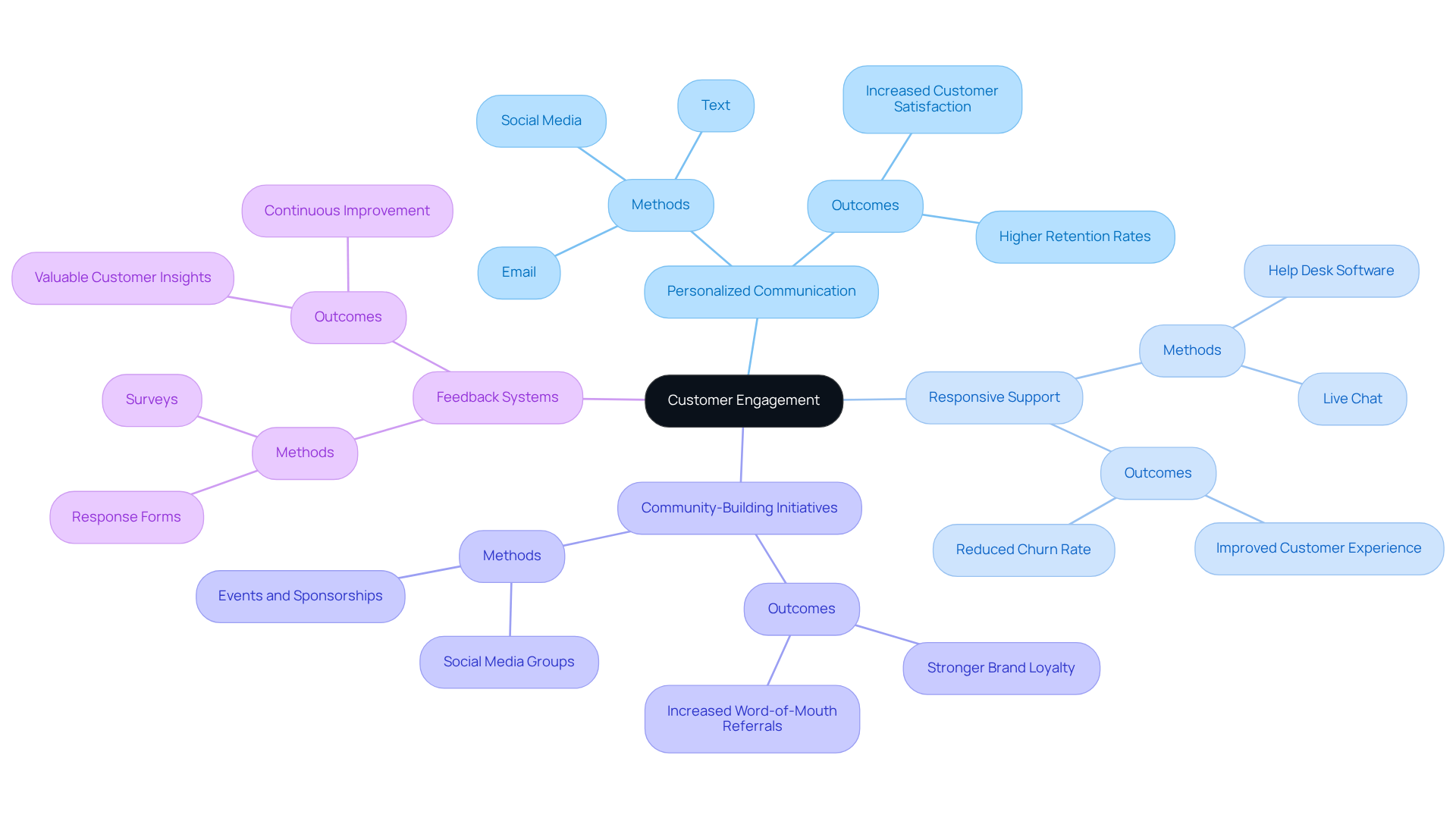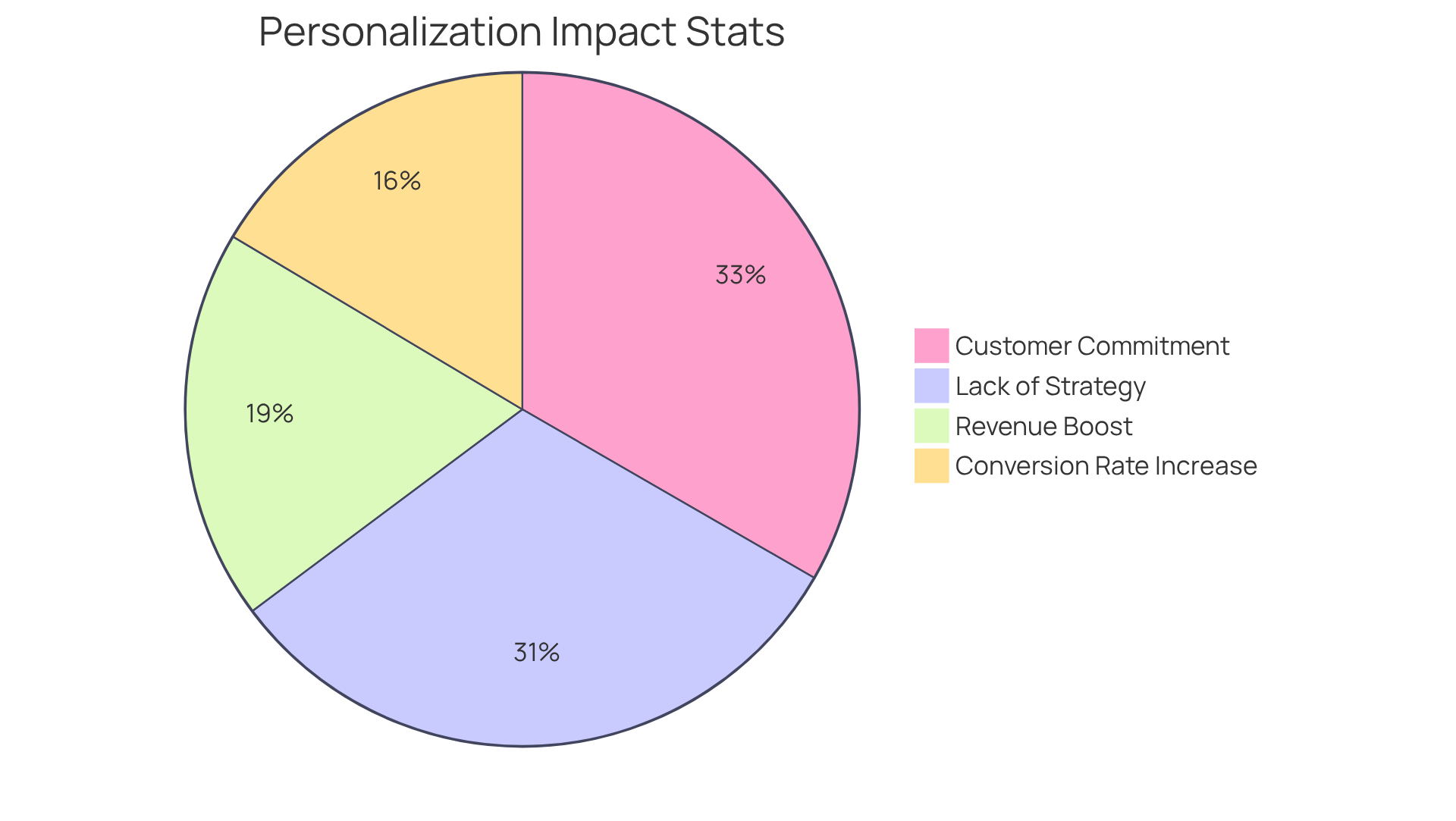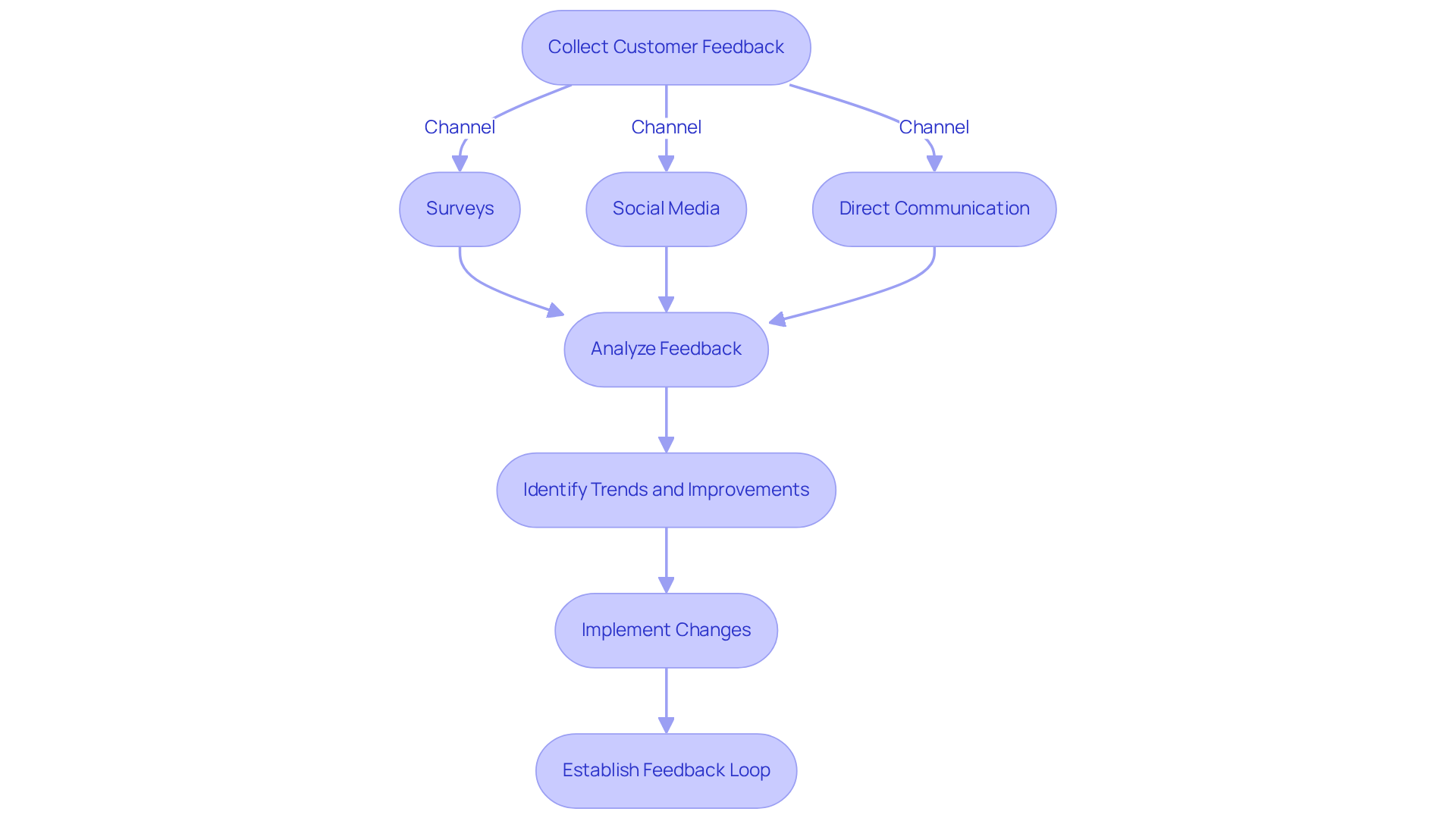
Overview
Boosting repeat sales necessitates engaging existing customers through personalized communication, effective loyalty programs, and active feedback analysis.
- Tailored interactions and rewards are critical; they significantly enhance customer loyalty and retention, ultimately leading to increased sales.
- This is evident in the successful strategies employed by renowned brands like Starbucks and Amazon, which serve as benchmarks in the industry.
Introduction
Engaging existing customers is not merely a strategy; it is a vital lifeline for businesses determined to boost repeat sales and cultivate brand loyalty. By grasping the nuances of customer engagement, companies can unlock substantial opportunities, including increased customer lifetime value and enhanced word-of-mouth referrals.
However, the challenge resides in effectively implementing personalized marketing, loyalty programs, and feedback mechanisms that resonate with customers.
How can brands navigate this landscape to ensure their efforts translate into enduring relationships and repeat purchases?
Understand Customer Engagement and Its Impact on Repeat Sales
Client engagement encompasses the vital interactions and relationships that a company nurtures with its clients throughout their journey. Engaged existing customers are not only more likely to make repeat purchases; they also become advocates for the brand, driving organic growth through word-of-mouth.
Research indicates that companies with elevated levels of client engagement experience a substantial increase in customer lifetime value (CLV). For example, studies demonstrate that 81% of consumers favor companies that provide personalized experiences, underscoring the necessity of tailored communication.
To enhance engagement, companies must prioritize fostering meaningful interactions through:
- Personalized communication
- Responsive support
- Community-building initiatives
Employing various contact methods—such as email, text, and social media—can further fortify these interactions. Organizations that actively engage with their existing customers on social media platforms consistently report higher retention rates, as clients feel valued and connected to the organization's mission and values.
Furthermore, implementing client feedback systems, such as surveys and response forms, can yield invaluable insights, allowing companies to continually refine their products and strengthen client loyalty. It is imperative to avoid excessive automation in client interactions, ensuring that the human touch remains a fundamental aspect of engagement strategies.

Implement Effective Loyalty Programs to Boost Customer Retention
To enhance client retention effectively, brands must implement reward schemes that resonate with their target audience. Successful loyalty initiatives often feature tiered rewards, allowing customers to accumulate points for purchases that can be redeemed for discounts or exclusive offers. For example, Starbucks Rewards enables patrons to earn stars with each purchase, which can be exchanged for complimentary drinks or food items. This program includes three tiers that unlock benefits such as free birthday beverages and early access to new offerings, thereby increasing client engagement through a structured incentive system.
Tailoring incentives to align with client preferences significantly boosts the appeal of these initiatives. MyPanera Rewards, for instance, customizes rewards based on distinct consumer behaviors, resulting in over 50% of transactions coming from members of the rewards program. Additionally, ensuring that the rewards system is user-friendly is crucial, as complexity can deter user interaction. Brands like Sephora have successfully maintained client loyalty through their 'Beauty Insider' program, which offers a variety of benefits while keeping the registration process straightforward.
Consistent communication about the benefits and updates of the rewards system via email or app notifications is vital for keeping clients informed and motivated to engage. Programs that incorporate gamification elements, such as challenges or contests, can further enhance engagement. Chipotle's rewards system, for example, has seen substantial growth, contributing to over $2 billion in digital sales, partly due to its engaging features like the 'Race to Rewards Exchange' game. By focusing on these strategies, brands can develop effective retention schemes that not only retain patrons but also encourage repeat purchases. It is essential to recognize that improving client retention by just 5% can increase revenue by 25 to 95%, underscoring the importance of effective reward systems. Brands must also be cautious not to overcomplicate their rewards programs, as this can lead to confusion and disengagement among clients.

Utilize Personalized Marketing to Strengthen Customer Relationships
Personalized marketing is a powerful strategy that customizes messages and offers to individual clients based on their preferences, behaviors, and purchase history. This approach significantly enhances relationships with existing customers and drives repeat sales. Research indicates that companies excelling in personalization can boost their revenue by as much as 40%. Moreover, those with advanced personalization strategies are 71% more likely to report significant enhancements in customer commitment.
By leveraging data analytics, companies can effectively segment their audience and deploy targeted email campaigns that resonate with individual interests. In fact, personalized emails deliver transaction rates six times higher than their non-personalized counterparts. Additionally, employing dynamic website content that adapts to user behavior fosters a more engaging shopping experience.
For instance, Amazon's recommendation engine suggests products based on previous purchases, enriching the shopping journey and encouraging additional purchases. In today's market, where 76% of consumers express frustration when they don’t receive personalized interactions, the strategic use of data analytics in personalized marketing becomes essential for companies aiming to cultivate loyalty among existing customers and boost sales.
Furthermore, Parah Group's proven strategies in Conversion Rate Optimization (CRO) have yielded substantial outcomes, including a 35% rise in conversion rates and a 10% enhancement in revenue per visitor for a $30M clothing line. These results underscore the critical importance of integrating personalized marketing with effective CRO strategies to maximize profitability.
It is crucial to note that 67% of retailers lack a clearly defined personalization strategy, highlighting the significant risks associated with inadequate personalization efforts.

Analyze Customer Feedback to Optimize Engagement Strategies
To enhance engagement strategies, brands must prioritize the active collection and analysis of client feedback. This objective can be accomplished through various channels, including:
- Surveys
- Social media interactions
- Direct communication with clients
Employing tools such as the Net Promoter Score (NPS) is essential for assessing client satisfaction and retention; by 2025, the average NPS benchmark for eCommerce is projected to be 62, indicating a robust level of client satisfaction. A commendable NPS for eCommerce businesses typically stands at 45 or higher, signifying strong loyalty among clients.
Once feedback is gathered, companies should systematically organize and analyze the data to uncover trends and pinpoint areas for improvement. For example, if users consistently report challenges in navigating a website, this feedback can lead to critical UI/UX enhancements, ultimately improving the overall shopping experience.
Effective NPS implementation involves:
- Segmenting responses by demographics
- Scrutinizing detractor comments to gain deeper insights
Furthermore, establishing a feedback loop—where clients are informed about how their insights have led to tangible changes—can significantly bolster engagement, demonstrating that the company genuinely values their input. Following up with detractors within 24 hours can convert up to 20% into promoters, underscoring the importance of timely responses. This strategy not only fosters loyalty but also encourages customers to become advocates for the brand.

Conclusion
Engaging existing customers is an indispensable strategy for driving repeat sales and cultivating long-term brand loyalty. By prioritizing meaningful interactions, implementing effective loyalty programs, and leveraging personalized marketing, businesses can significantly enhance customer retention and satisfaction. The focus on personalized communication and community-building initiatives not only fortifies relationships with clients but also transforms them into brand advocates, thereby amplifying organic growth.
Key insights highlight the critical importance of tailored engagement strategies, such as personalized marketing and responsive support, which resonate with customers' preferences and behaviors. The implementation of loyalty programs that cater to individual needs, coupled with the active collection and analysis of customer feedback, can yield substantial improvements in client satisfaction and retention rates. Companies that embrace these best practices are strategically positioned to increase customer lifetime value and ultimately bolster their revenue.
In today's competitive marketplace, the significance of engaging existing customers cannot be overstated. Organizations are urged to adopt these strategies proactively, ensuring they not only meet but exceed customer expectations. By doing so, businesses can cultivate a loyal customer base that not only returns for repeat purchases but also champions the brand, driving further success through word-of-mouth and referrals. Embracing these best practices will pave the way for sustainable growth and a thriving business landscape.
Frequently Asked Questions
What is customer engagement?
Customer engagement refers to the vital interactions and relationships that a company nurtures with its clients throughout their journey.
How does customer engagement impact repeat sales?
Engaged existing customers are more likely to make repeat purchases and become advocates for the brand, driving organic growth through word-of-mouth.
What is the relationship between customer engagement and customer lifetime value (CLV)?
Companies with elevated levels of client engagement experience a substantial increase in customer lifetime value (CLV), as engaged customers tend to have a longer and more profitable relationship with the brand.
What percentage of consumers prefer companies that provide personalized experiences?
Research indicates that 81% of consumers favor companies that provide personalized experiences.
What strategies can companies use to enhance customer engagement?
Companies can enhance engagement by prioritizing personalized communication, providing responsive support, and initiating community-building initiatives.
What contact methods can strengthen customer interactions?
Various contact methods such as email, text, and social media can strengthen customer interactions and foster engagement.
How does social media engagement affect customer retention?
Organizations that actively engage with their existing customers on social media platforms consistently report higher retention rates, as clients feel valued and connected to the organization's mission and values.
Why is client feedback important for engagement?
Implementing client feedback systems, such as surveys and response forms, provides invaluable insights that allow companies to continually refine their products and strengthen client loyalty.
What should companies avoid in their engagement strategies?
Companies should avoid excessive automation in client interactions to ensure that the human touch remains a fundamental aspect of their engagement strategies.
FAQs











